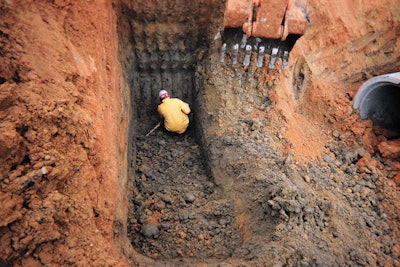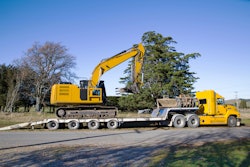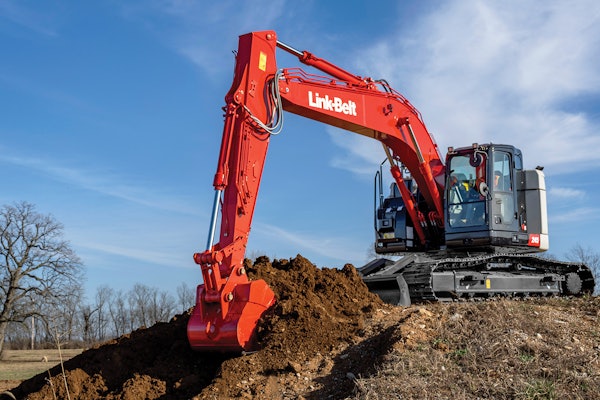 An example of an unsafe trench. Photo by David Dow, TrenchSafety and Supply
An example of an unsafe trench. Photo by David Dow, TrenchSafety and SupplyOSHA has fined Karrenbrock Excavating, Wentzville, Missouri, $189,221 for willful, serious and repeat citations for allowing two employees to work in an unprotected 11-foot-deep trench while installing sewers this January in Lake Saint Louis, Missouri.
The firm had been cited two previous times for failing to protect employees in trenches, once in 2013 and again in 2016.
For the current incident, Karrenbrock Excavating received three citations (the serious citation had four items):
- Willful, $99,589, for not protecting employees from cave-ins with an adequate protective system.
- Repeat, $40.796. Prior to the January 30thincident in Lake Saint Louis, Karrenbrock Excavating had previously been cited for failing to provide a trench protective system on June 28, 2013 on a jobsite in St. Charles, Missouri, when it received a $2,400 fine, and on March 17, 2016, on a job in O’Fallon, Missouri. In that incident, the company received a $5,200 fine, negotiated down from an initial penalty of $10,400.
- Serious, $9,959, for not conducting frequent and regular inspections of the jobsite to identify potential hazards and keep employees safe.
- Serious, $9,959, for not instructing employees how to recognize, avoid and prevent potential unsafe conditions.
- Serious, $9,959, for not having a safe means of exiting a trench (stairway, ladder, ramp or other safe means of egress) no more than 25 feet apart in a trench that’s 4 feet or more deep.
- Serious, $9,959, for not keeping materials or equipment at least 2 feet from the edge of the trench, or preventing materials or equipment from falling or rolling into the trench by using a retaining device
OSHA’s most severe charge is what it calls a “willful” violation, meaning the employer demonstrated intentional disregard or indifference to employee safety. Willful violations were issued in 14 incidents representing 16 trench fatalities in the past two years.
Initial OSHA fines in incidents with willful violations totaled $3.99 million, according to an Equipment World investigation. That number, however, is cut to $2.5 million when the nearly $1.5 million Atlantic Drain Service fine for two deaths in downtown Boston outlier is removed. For the 13 remaining incidents with willful violations, the average initial fine was $129,070.
In addition to Atlantic Drain, three other companies received high initial fines for trench safety infractions during 2016-2017. Arrow Plumbing, Blue Springs, Missouri, received a $294,059 initial fine for the death of David (D.J.) Meyer, age 33. OSHA fined JK Excavating & Utilities, Mason, Ohio, $202,201 for the death of Zachary David Hess, age 25.
As Karrenbrock Excavating discovered, high fines aren’t just the result of a fatality: Kamphuis Pipeline, Grand Rapids, Michigan, received a $187,653 fine for exposing its employees to trench cave-ins. OHSA fined Jax Utilities Management, Jacksonville, Florida, an initial $271,606 after an investigation of an employee injury in a trench. That fine since has been reduced to $135,836.
Contractors aren’t the only entities cited for trench-related incidents. This month, OSHA levied a nearly $200,000 fine against the City and County of Honolulu Board of Water Supply following a January inspection of a jobsite with a 7-foot deep trench.
OSHA found the water utility negligent in installing a shoring system according to the manufacturer’s tabulated data and failing to control the accumulation of water in the trench. Like Karrenbrock Excavating, the water board was a repeat violator, having been cited in 2014 and 2017 for similar trench shoring safety issues.











